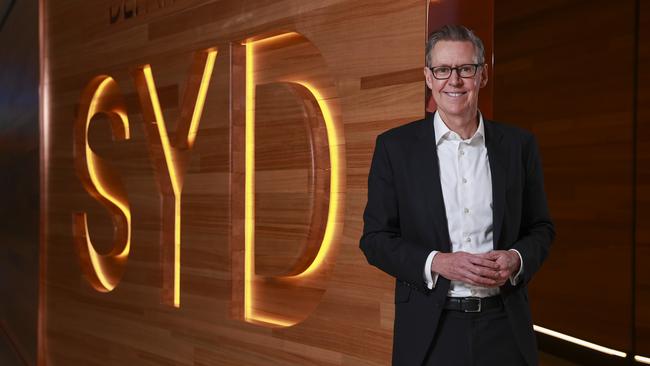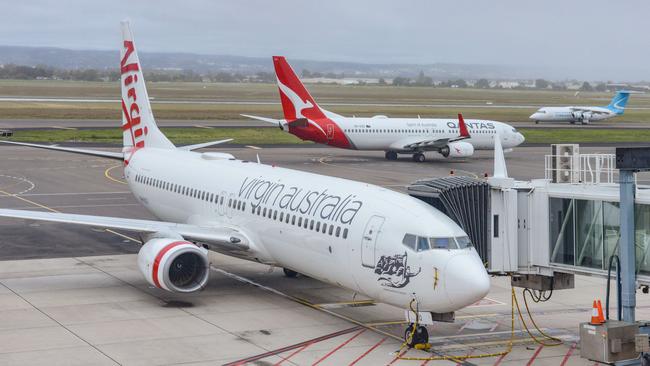Forensic audit needed to resolve claims of slot hoarding by Qantas and Virgin Australia
The designer of Sydney Airport’s slot management scheme wants a forensic audit to determine whether major airlines are ‘slot hoarding’ to keep out competitors.

The mastermind of Sydney Airport’s slot management scheme has called for a forensic audit to determine whether major domestic airlines are “slot hoarding”.
Sydney Airport chief executive Geoff Culbert has accused Qantas and Virgin Australia of the practice, which involves maintaining more slots than needed for the purpose of keeping competitors out.
Slots are the time windows allocated to airlines for the operation of flights in and out of Sydney.
They are granted to carriers on request by Airport Co-ordination Australia, based on availability, on the condition the airline makes use of the slot 80 per cent of the time.
Mr Culbert’s accusations of slot hoarding stemmed from high cancellation rates on key routes such as Sydney-Melbourne and Sydney-Canberra, and he said suggested the airlines did not need as many slots as they had.
Last week Mr Culbert even called for the carriers to relinquish some of their slots, to aid the entry of new players into Sydney such as Bonza and international airlines.
Public policy adviser Peter Harris, a former chair of the Productivity Commission, authored Sydney’s slot management scheme and completed a review of the system in 2021.
On Tuesday, he appeared before federal parliament’s standing committee on economics to shed light on competition in commercial aviation.
Asked if slot hoarding was occurring in Sydney, Mr Harris said there was evidence to suggest it was.
“We could see enough in the data to say that’s not an unreasonable claim to make but we could not see enough in the data and the recording of factors that caused the cancellation to conclude that was the case, which is why we need a forensic audit,” he told the committee.
“There are good forensic audit techniques to follow up a particular slot and get a report on each of the performances that resulted in a cancellation and report back to a committee.”
He recommended the entire demand management scheme at Sydney Airport be “substantially updated” given that it was now more than 20 years since he designed it.
“New entrants don’t get the same priority (as incumbent airlines) under our scheme,” Mr Harris said.
“The scheme favours incumbents and there’s a recommendation in the review to alter that so new entrants can obtain slots more easily.”

He told the standing committee that without Sydney Airport slots, an airline would struggle to survive in the Australian domestic market.
But Mr Harris also denied the suggestion the market was not big enough to support more than “two and a bit airlines”.
“I’m pretty sure that the Sydney-Melbourne corridor is the second or third most utilised corridor in the world, so to say that can only support two carriers is absurd,” he said.
“I think we can have more than two without any doubt and the Sydney-Melbourne corridor and its use is a good reason why.”
The government’s aviation white paper was looking at reforms to Sydney Airport’s demand management scheme, as well as consumer protections such as compensation for delayed or cancelled flights.
Mr Harris said it would be difficult to define when a traveller should be compensated but it was “worth some scrutiny”.
“If you were affected by a cancellation that requires you to stay overnight, then I think there’s a much clearer case of having compensation than one that says ‘I was delayed by two-hours therefore you owe me money’,” he said.
Qantas and Virgin Australia have both denied allegations of slot hoarding, insisting they were using their allocated times in accordance with the rules.
“Where cancellations occur, they are primarily due to factors outside of the airline’s control,” said the Qantas submission to Mr Harris’ review.
“These include weather events and operational cancellations such as unscheduled engineering events.”
A Virgin Australia spokeswoman said the current framework for slot management “allowed for competition in the Australian aviation market and supported new entrants”.







To join the conversation, please log in. Don't have an account? Register
Join the conversation, you are commenting as Logout